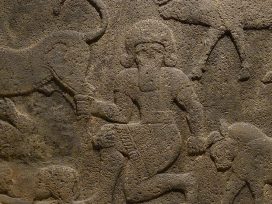Would you believe that some even congratulated me? What a great achievement it was supposed to be, to see one’s poems exhibited in French at the Blue Palette Gallery in the middle of Paris! To have been the subject of a programme on Turkish poetry on Paris Radio! At first, I must admit, I thought they were joking, and played along. Then I realised that they were serious, and I was annoyed. Here’s why:
Imagine that a Norwegian comes to Istanbul, lives here for a while, becomes fluent in Turkish, translates some works by Norwegian poets, presents them at a gallery in either Asmalimescit or Tarlabasi (the artists’ district in Istanbul, the equivalent of Monmartre – ed.) and Istanbul Radio reports on this in an off-peak programme that no one listens to. Would Norwegian poetry become known in Turkey? Don’t give me all that about relevancy; this is exactly what is happening right now!
The problem begins with the fact that the translators are Turkish. Have you ever seen a Frenchman translating French poetry into Turkish? I haven’t, and I don’t think I will until the end of my life. Then why should Turkish poets be translated into French, not by the French, but by the Turkish? By doing this, we have shamefully agreed to one bitter prejudice: they are so elevated and important that they would never “stoop” to doing something like this; we, on the other hand, are weak and backward in art; we have finally begun to come up with works slightly resembling theirs, so if we were to attract their attention, maybe they would “honour” us by showing a little interest, while mentioning Turks once or twice. If so, whatever happened to that almighty “Turkish pride” that we mention at every opportunity?
We were battling on the script of Devlerin Öfkesi (“The Fury of The Giants”) with, I think, Nevzat Pesen (the director – ed.), when a letter arrived: it was from Memet Fuat. This or that American magazine was preparing an issue or a dossier about Turkish poetry, so I should send English translations to him – him being the representative of the magazine. If there were no translations, could I have someone I trusted translate them? Amidst all that confusion, I went into a first-class rage! As you would have expected, I wrote to the meek, overly good-natured Memet Fuat that I could not be bothered with such nonsense, and that Americans who wanted to read Turkish poets could very well learn a Turkish word or two. This was five or six years ago. Yet, he, with his very respectable sense of responsibility, managed to come up with something to send them. Our daily papers made a great fuss about that, too!
Translators are Turkish, so is the audience. Of the five thousand or so Turks living in Paris, the ones who keep up with current developments must have seen the exhibition, out of curiosity or homesickness. Some interested French people must also have stopped by. Yet is this the problem, or is it the fact that we regard this “innocent” and “humble” exhibition as “being recognized in the West”, in the press or during conversations with friends? Oh, what a fuss! You don’t know that the Club des Poètes is a lacklustre programme aired by the ORTF after eleven at night and never tuned into by anyone; you haven’t heard that Orient magazine is a dubious publication that mostly exploits similar complexes of easterners; and, as if this wasn’t enough, you have no idea that the publishing industry in France has all the machinery in place that allow even a fortune cookie poet to publish his works for a price (no offence to our people). And you prance about saying, “We are being spoken about even in France!” It is such a disgrace!
Most of you will resent this, but it is time to confess: I am one of those unfortunates who, despite rummaging in every bookstore in Paris, was unable to get hold of any French translations of our novelists. I never saw one in the shop windows, and the bookshops where I inquired about such titles passed me on to each other like a volleyball, and finally sent me to a hellhole. I thought that I should have been able to easily acquire Yasar Kemal’s “world-famous” Ince Memed (Memed My Hawk) or Kemal Tahir’s Köyün Kamburu (The village hunchback), but it was not meant to be. Everywhere I went, they tried to push copies of Nazim (Hikmet) onto me, and no one understood why I was insisting on other authors.
Doesn’t it look kind of strange to you, too, that the “Turkish novel” in France never refers to Yakup Kadri, Hüseyin Rahmi, Halit Ziya, Resat Nuri, Halide Edip and other classics, but always to Suat Dervis, Kemal Tahir, Yasar Kemal, etc., and that all of these are translated and offered to publishers by the same Turkish translators? I am sort of curious…
What about the critiques, you will ask, which appeared in our press one after another? I will answer: those who are informed know very well that French critics are not like our lazy cats who tend to write as it pleases them. Those people regard it as their solemn duty to follow every publication and scribble a thing or two for every work. But interpreting those critiques with an inexplicable pompousness like “We conquered Paris!” is way over the top.
Time for the hard facts: France doesn’t know us, and doesn’t wish to know us. When it comes to the eastern Mediterranean area, only two countries ring a bell in their minds: Greece and Israel. The rest is empty talk. Your Orhan Kemal might be a better novelist than (Nikos) Kazantzakis; your (Fazil Hüsnü) Daglarca might be a better poet than Seferidis; who cares? The French, with their traditional instincts, will prefer the Greek and lean towards the Jewish. The Turk generally has negative connotations for them: the people who tormented Nazim; the people who hung (their own prime minister Adnan) Menderes; the people who bombed poor, unarmed Greeks (in Cyprus, during the troubles of 1963-1964 – ed.) with their jets, etc. etc.!
Can we not eliminate these blatant misconceptions? Maybe we can; but then the problem will be one of creating a general Turkish art event among French circles. You must create such a significant, expansive and interesting national literature, you must produce so many great works one after another, that the French will finally begin to feel they are missing something due to their lack of knowledge; it is only then that they will try to study your literature, learn your language and begin translating your works into their own. This is difficult; extremely difficult at that, but not impossible. The Russians did it in time, so did the Spanish, and now the Arabs, mostly Maghreb Arabs, are trying. We can’t achieve anything with personal connections or by pulling political strings if we don’t come up with an authentic literature, and the individual endeavors of Erhan Bener or Akil Aksan will be to no avail; maybe a flicker of light here and there, which will die down very quickly. To have or not to have an authentic literature: that is the question! The rest is merely a waste of time.
Well, you will ask, wasn’t that poetry exhibition of any use at all? The answer to this lies in the letter I received from a Frenchman, who, because he has visited Istanbul and is my friend, is extremely observant of anything that happens in Paris concerning Turkey:
“I have not heard anything about the exhibition you mentioned. If I had, I would definitely have visited the Blue Palette to read your works – and the works of others – in French.”
It is an artist, a poet, who writes this letter, and he hasn’t even heard. Don’t look further: How many of us know anything about the Swedish poetry Lütfü Özkök has been translating to Turkish for years? How many of us know a single line of Swedish poetry?
And then we celebrate ourselves! Oh the foolery!






